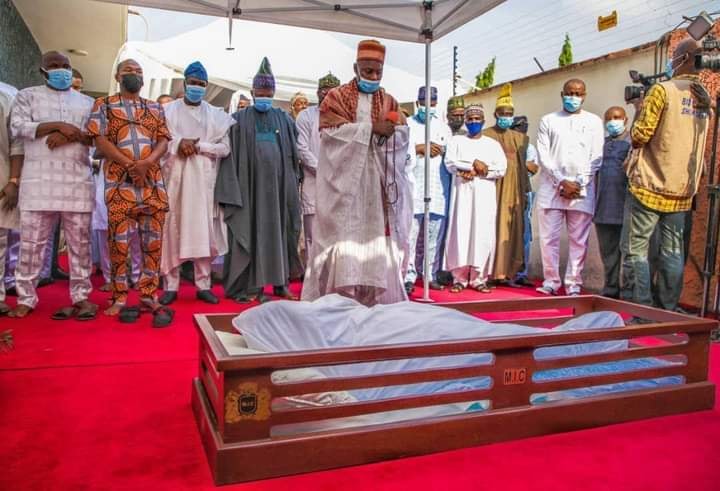This story has to be expanded to correct and accommodate errors that readers have written to point out. From Jos comes the caller who said Intervention had killed Dr. Garba Nadama who took over in the wake of the demise of Shehu Kangiwa as governor of the old Sokoto State. Dr. Garba Nadama is still alive. May death also forget him as Intervention did.
Also not mentioned at all is Abba Musa Rimi who succeeded Abdulkadir Balarabe Musa as governor of Kaduna State in 1981 after the latter’s impeachment. He is very much alive and our plea is that death would also foreget Abba Musa Rimi for as long as possible.
There is the caller from Ife who reminded Intervention of the omission of Imo State governor then, Sam Mbakwe. Dr Sam Mbakwe of Imo State, now Imo and Abia was, indeed, a phenomenon. His distaste for underdevelopment and poverty made him to weep and make statements such as calling for return of the colonialists. Eventually, he was nicknamed the ‘weeping governor’. Today, he is liberally regarded as a colossus and development minded actor.
The old story remains what it was and it goes as follows:
Unlike today, there were 19 governors in the Second Republic in Nigeria, 1999 – 1983. Of the 19, only two are now alive. 17 others have died, making it a case of how time flies.
The benefit of hindsight allows us to describe that generation or the class of 1979 a spectacle in Nigerian politics. They were a spectacle in colorfulness and in substance, and to the last detail. Each one of them brought something to the table, whether we are talking of Mohammed Abubakar Rimi with his abrasive, Kano middle class radicalism or Bola Ige’s Cicero Geist; or Ambrose Ali who was not just a professor but Professor of Morbid Anatomy. There was something chilling in that as then Concord journalist, Tom Borha said in an op-ed. He never tire in making a joke of the morbidity in the title. Ali was remarkable in thinking and acting modern, establishing a state government university at a time it was still a novelty in Nigeria.
There was Clement Isong, a former Governor of the Central Bank who held sway in what is now Akwa Ibom and Cross Rivers. And then Lateef Jakande in Lagos, seeing the future of intra-city transport in the rail line as early as the 1980s. Michael Ajasin with his vast connection to most of the educated elements in the Southwest held sway in what is now Ekiti and Ondo states while Bisi Onabanjo, aka ‘Aiyekoto’ took charge of affairs in Ogun State. He shares professional identity with LKJ.
Tatari Alli, a former Federal Permanent Secretary when they were really ‘permanent’ took care of Bauchi which is now Bauchi and Gombe states; Mohammed Goni, a former student activist, climbed power in Borno State, now Borno and Yobe states; Abubakar Barde in Gongola State which is now Adamawa and Taraba states. What is now Kaduna and Katsina states had the sober and morally decent Abdulkadir Balarabe Musa, a veteran of anti-establishment radicalism in the North. He was remarkable in his confidence in assembling very opinionated and assertive activist intellectuals and, till today, no one has beaten his record in terms of an agrarian transformation strategy. Chief Melford Okilo was there in Rivers State, now Rivers and Bayelsa. Chief Solomon Lar bestrode the Plateau with his ‘Emancipation’ agenda. The state is what is now Plateau and Nasarawa states. Lar was a paradox: he was painted as a hater of Hausa-Fulani but it was Mary Lar, his wife, who first thought out the idea of nomadic education programme. His counterpart in Benue State was Aper Aku who, within just a term, set the state firmly on an industrial footing, unaware that the locusts would descend and clear everything after him. Aku remains the governor to beat in terms of authentic developmental stride.
There were two governors from Sokoto State. Shehu Kangiwa died when he fell off the horse in a Polo outing in Kaduna. Dr. Garba Nadama, his deputy, a PhD holder in History, stepped in. The last but not the least was Adamu Attah in Kwara State who spent a lot of the time fighting with his godfather, the late ‘Oloye’, Abubakar Sola Saraki.
Of this class, only Auwal Ibrahim, the incumbent Emir of Suleija in Niger State and Chief Jim Nwobodo then of Anambra State are alive after LKJ’s death earlier this week. Anambra then is now Anambra and Enugu states.
This is the sense in which LKJ marks the end of an era. A number of things have happened since 1983 when their rule was terminated in the December 1983 coup. The passage of time has given them a clean bill of an exceptional class in Nigerian politics in terms of quality of mind, pedigree, tempered or melted personality and qualitative rather than quantitative governance. It is possible that in another 20 years from now, the current set of governors might, collectively, look like saints just as it is also possible that they would look like midgets. The point is that History can be deadly judge.




























